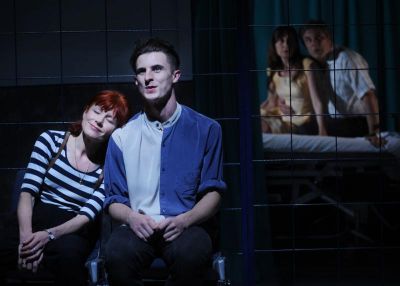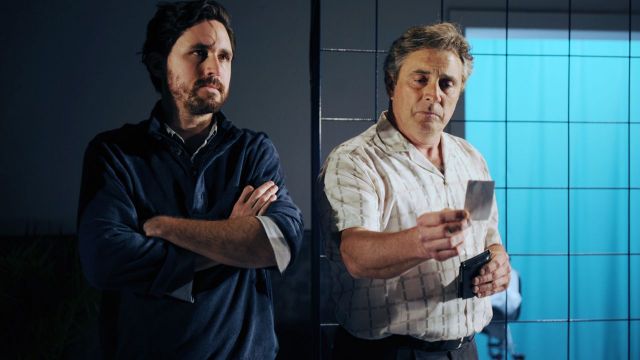Jurassica
Rafael and Sara leave their dirt poor village in Italy for a better life in… Moorabbin. Their son, Ichlis [sic] loves his parents and loves his father’s stories, especially the one where Rafael, back in the village, met a dinosaur in a cave – who advised him to move to Australia. (For non-Melburnians, Moorabbin is not the most salubrious of suburbs.) The move was, of course, ‘for the best’, but Rafael – now ‘Ralph’ - and Sara, in their different ways, burnish what they left behind with a nostalgic glow. Ichlis, of course, grows up and hates his name and chides his father for not speaking ‘good English’. Years later, Ichlis and his partner Penny find his parents’ village. The ‘cave’ is just a hole in the ground and the village… Why would anyone miss that?
Jurassica is the portrait of a family over three generations: Rafael/Ralph and Sara, their son Ichlis, and his son Luca. Ichlis’ partner Penny proves powerless as a peacemaker despite all her warmth and ironic humour.
It’s a play about displacement, about deracination. It is about disruption and sacrifices made with good intentions but also regret. And then, since no good deed remains unpunished, sacrifices are resented by the beneficiary. Ichlis does not reconcile with – I almost wrote ‘forgive’ – his father. Luca, who is able to love his grandfather in a less complicated if uncomprehending way, is still caught in the hostilities.
 The play employs a non-linear structure, moving between past and present so as to juxtapose key moments and find cause and effect. These transitions – that are sometimes overlaps like movie dissolves – are aided by Amelia Lever-Davidson’s subtle lighting. The intention is clear: the past is present, and cause and effect may be separated by time but they are just as linked, just as inevitable.
The play employs a non-linear structure, moving between past and present so as to juxtapose key moments and find cause and effect. These transitions – that are sometimes overlaps like movie dissolves – are aided by Amelia Lever-Davidson’s subtle lighting. The intention is clear: the past is present, and cause and effect may be separated by time but they are just as linked, just as inevitable.
Don Giovannoni throws in a most original wild card, in a way a sort of chorus that adds another layer to this family drama. She’s Kaja – a Serbian translator at the hospital to which ‘Ralph’ is taken after a stroke. A straight-talking, foul-mouthed ball of fire, she’s a refugee from the horrors of Belgrade. Her displacement is of another sort. She had to get out, but her nostalgia for ‘home’ is poisoned by her guilt at leaving it. She speaks five languages – none of them much needed now with the new waves of immigrants. But it is Kaja who can stand outside the family drama and provide sharp comment – and some prickly support for feckless, young gay Luca as he waits for his father to arrive from Perth before his grandfather dies. In its way, Jurassica is Luca’s story, not because he drives the narrative, but because he, saddled with a strange name too, cops the burden of the past.
As one expects from Red Stitch, the performances are excellent. Joe Petruzzi gives us a Ralph who is strong but stubborn, tender but quick-tempered, an enormously touching figure with a kind of old-fashioned masculinity. The last is pointed up by Devon Lang Wilton’s Penny: alone together, she flirts with Ralph and he enjoys it without ever crossing any boundary. Ms Lang Wilton gives a nice arc to her character: warm, adaptable, teasing, funny – but eventually retiring defeated by this family’s past and only there at the end because it’s ‘the right thing’.
Caroline Lee’s Sara is perhaps the underwritten character in the ensemble, but then three quarters of her dialogue is in Italian – a challenge she meets with her usual ability. (Overall, I have to say that there is rather too much dialogue in Italian when what is conveyed is crucial.) Her Sara is no stereotypical Italian Mama; she is almost ethereal, floating through her scenes. Her speech about losing her native language is arresting and very moving. Jordan Fraser-Trumble, as Ichlis, has a tough call. A good-looking fellow with a brooding presence (at least here), his character is continuously irritable or emotionally inept and the writing doesn’t dramatise his turning points - such as when he turned against his father and when his relationship with Penny finally failed. Edward Orton, the least experienced member of the cast, is totally convincing as Luca, a contemporary kid – self-absorbed although with depths of unspoken feeling, and his eye on Grindr even in the middle of a family crisis. His character is written without a shred of sentimentality and he makes the most of it.
 Olga Makeeva is Serbian Kaja. What to say about Ms Makeeva? In show after show, she is simply riveting. It’s not just because of the red hair and diminutive but dynamic body that you can’t take your eyes off her. It’s her attack, the timing of her focussed energy that she holds back… and then fires – POW! In her scenes with Mr Orton, who’s about twice her height, she is intimidating, unsettling and utterly loveable.
Olga Makeeva is Serbian Kaja. What to say about Ms Makeeva? In show after show, she is simply riveting. It’s not just because of the red hair and diminutive but dynamic body that you can’t take your eyes off her. It’s her attack, the timing of her focussed energy that she holds back… and then fires – POW! In her scenes with Mr Orton, who’s about twice her height, she is intimidating, unsettling and utterly loveable.
Mr Giovannoni’s play is beautifully and subtly observed, and sensitively directed by Bridget Balodis. It has emotion and it has humour, but in the end truthful observation is perhaps not quite enough. It is an achievement to get things right, as they really are, but we want more. The play, fine as it is, lacks a dynamic and that leaves us somehow outside. As remarked, it is a portrait – that is, rather than a story; they are not the same thing.
Michael Brindley
Images (from top): Jordan Fraser-Trumble & Joe Petruzzi, Olga Makeeva, and Olga Makeeva & Edward Orton. Phototographer: Jodie Hutchinson
Subscribe to our E-Newsletter, buy our latest print edition or find a Performing Arts book at Book Nook.

